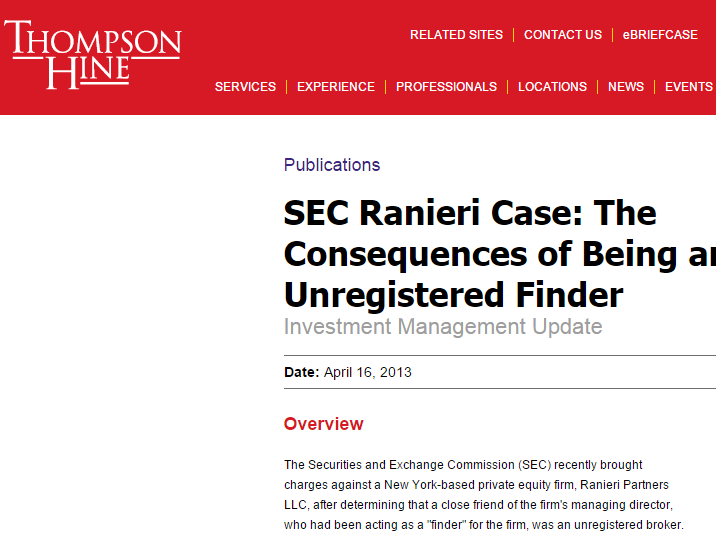SEC Ranieri Case: The Consequences of Being an Unregistered Finder
Overview
The Securities and Exchange Commission (SEC) recently brought charges against a New York-based private equity firm, Ranieri Partners LLC, after determining that a close friend of the firm's managing director, who had been acting as a "finder" for the firm, was an unregistered broker. The settlement arranged last month required William M. Stephens, the finder, to pay approximately $2.83 million in disgorgement and prejudgment interest. Additionally, the fund manager and the fund's managing director agreed to pay $375,000 and $75,000 in penalties, respectively.
This update provides a general overview regarding the payment of "finder's fees," and discusses when finder activities require registration as a broker-dealer. A finder cannot "induce or attempt to induce the purchase or sale" of any security without registering as a broker-dealer. To avoid registering, a finder should receive a flat fee and restrict his/her activities to introducing issuers and potential investors. If a firm wants the finder to solicit investors, perform analysis of either potential investors and/or the firm, or provide potential investors with information regarding the firm, it should retain a registered broker.
Broker Versus Merely a Finder
The distinction between a broker and a finder is important. A "broker" is any person engaged in the business of effecting transactions in securities for the account of others. Someone who takes steps to induce or bring about a transaction is a broker. A "finder" is someone who finds, introduces and brings parties together for a transaction. A finder leaves the negotiation and consummation of the transaction to the parties themselves.
Activities and Actions to Consider When Using a Finder
Generally, the SEC's determination of whether or not broker-dealer registration is required focuses on whether compensation is transaction-based. The SEC has indicated that registration helps ensure persons with a "salesman's stake" in a securities transaction operate in a manner consistent with consumer protection standards governing broker-dealers, such as sales practice rules. Additionally, the SEC staff looks at whether an individual is "effectuating" transactions.
The SEC considers the following to be broker activities:
- Receiving contingent fees or any compensation tied to obtaining or completing a transaction. In Ranieri, Stephens received transaction-based compensation totaling $2.4 million.
- A finder agreement should use flat fees unless the finder is a registered broker.
- Firms with in-house finders who are paid "success fees" should ensure that such persons are appropriately registered.
- Major private funds in the United States have launched their own captive broker-dealers to ensure compliance with SEC and FINRA regulations.
- Negotiating and consummating transactions. This includes advising on the merits of particular opportunities. Such activity may be interpreted as effectuating the transaction.
- A finder should only introduce the parties and not take part in anything further, unless the finder is a registered broker.
- "Pre-screening" or "pre-selling" to potential investors. Gauging potential investors' needs and interest in the security has been interpreted by the SEC as effectuating the transaction.
- Advising on or evaluating the investment. In Ranieri, Stephens provided potential investors with his analysis of the firm's strategy and performance records. He provided potential investors with the identity and capital commitments of other investors. He also urged investors to reallocate their portfolio to accommodate an investment with the firm.
- A finder should not recommend the investment or discuss the details of the transaction.
- Actively soliciting investors (e.g., distributing promotional material). In Ranieri, Stephens provided private placement memoranda, subscription documents and due diligence materials to potential investors.
- A finder should not distribute any materials unless the finder is a registered broker.
Mentions
Securities Disclaimer
This website is for informational purposes only and does not constitute an offer or solicitation to sell shares or securities. Any such offer or solicitation will be made only by means of an investment's confidential Offering Memorandum and in accordance with the terms of all applicable securities and other laws. This website does not constitute or form part of, and should not be construed as, any offer for sale or subscription of, or any invitation to offer to buy or subscribe for, any securities, nor should it or any part of it form the basis of, or be relied on in any connection with, any contract or commitment whatsoever. EB5Projects.com LLC and its affiliates expressly disclaim any and all responsibility for any direct or consequential loss or damage of any kind whatsoever arising directly or indirectly from: (i) reliance on any information contained in the website, (ii) any error, omission or inaccuracy in any such information or (iii) any action resulting therefrom.




